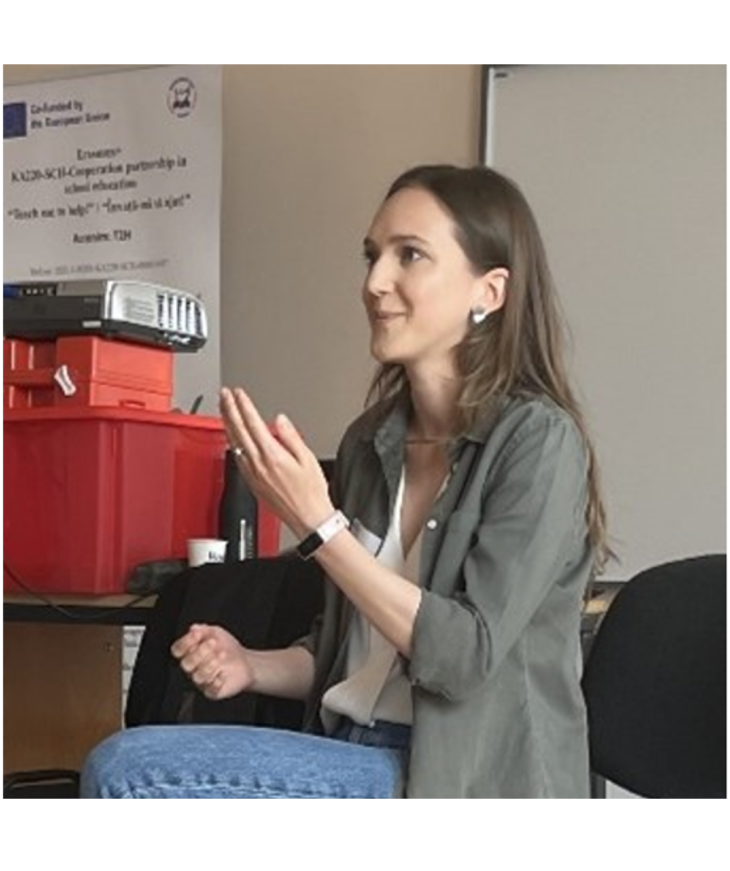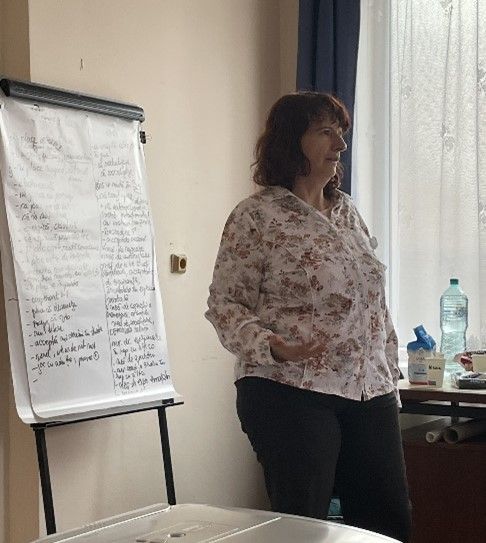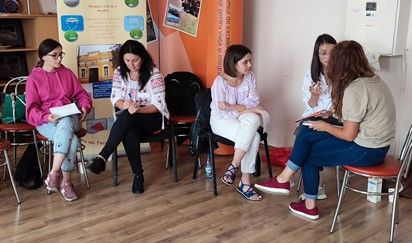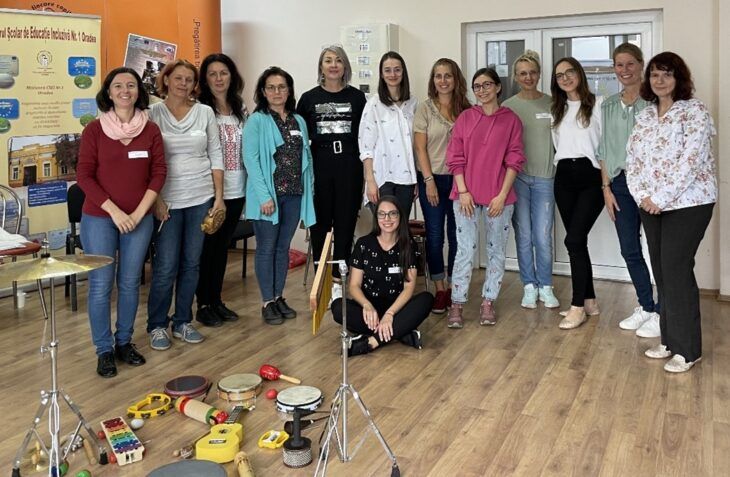Larisa Neculai: Intensive Study Training 2022, Romania
Romania
- Children
- Young people
- Disability
- Activities

Citiți această postare în Română.
At the beginning of September, I was delighted to join the Intensive Study Training, which represents a vital moment of the Distance Learning Programme that Music as Therapy International runs in Romania, named ‘Therapeutic work with young children with disabilities’. I have had the privilege to experience this course both as a student (2019) and as a trainer (2021, 2022).
I graduated from the course in 2019 and felt confident in pursuing formal studies in the UK. I am currently a year three music therapy student at the University of the West of England, Bristol. I also work as a Music Therapy Assistant and I am particularly interested in music therapy in Romania. I contribute to the profession’s development as a local partner of Music as Therapy International and by participating in projects in Romania, such as the intensive study training. I am grateful for joining Alexia Quin and Monika Manases (Szabo) as part of this year’s trainers team.
The course runs over approximately one year. The Intensive Study training takes place after the time students spend focusing on theoretical aspects of the approach and before they put their learning into practice by undertaking a Practical Assignment. So by the time we joined the students for the weekend, they had already completed several theory modules, which hopefully gave them a strong foundation for the practical assignment, which involves offering music therapy to a group of children for eight weeks with support and supervision from Music as Therapy International.
Our aim was to facilitate the transition from theory to practice. During the two days we spent together, the ten students had several opportunities to revise the theoretical learning material, practice new skills, and engage in role-play or practical activities. Moreover, the students had the opportunity to feel ready to start the practical assignment with help from this year’s trainers.

Practical music-making was integral to everything we did throughout the weekend. All our teaching was interspersed with opportunities for the students to explore the musical instruments, participate in music activities and practice music techniques.
On Saturday morning, we focused on grasping theoretical concepts such as affect attunement or unconditional positive regard. We’ve spent the afternoon focusing on a deeper understanding of the client-therapist relationship through more practical experiences such as role-play.
Moreover, the students shared various needs and strengths of their clients, inspiring each other by working in pairs or groups.

On Sunday morning, we spent some time discussing the current context of music therapy in Romania. Then, the students explored the emotions that music and the instruments brought up during an extended group activity. We also identified solutions for possible difficult situations that might come up for our students in their music sessions. The weekend ended with looking at how to structure a session by participating in a series of group activities led by the trainers, who also offered practical ideas tailored to the students’ needs and circumstances.
A valuable memory is the celebration of a significant achievement – obtaining the local accreditation of the DLP by Colegiul Psihologilor din România (COPSI) through the collaboration with Asociația Sound Art E- motion, reference number Rf-II-BH-211/21.05.2022. Consequently, this year’s students will receive 50 professional credits after completing the course, which made them very happy.

One of the things I’ll remember from this weekend is that although the teaching materials have been carefully developed during the past ten years, the course has been running, there was plenty of scope for us to adapt them and be flexible in how we worked with the students, responding to where they would be working, the skills they already had, and their particular areas of interest.
I remember how, during this year’s intensive study weekend, I looked around the room and tried to recall my experience as a student on the course, which helped me empathize with the students. Moreover, being a previous student on the course allows me to identify moments where the learning material can be adjusted to facilitate the students’ understanding of it. I am grateful for my dual position regarding the IST, as being both a student and a trainer on the course helps me easily observe Alexia and Monika’s flexibility in adapting the learning material to the students’ immediate needs.
For instance, I’ve noticed that this year we’ve allocated ample time for thinking about unconditional positive regard. We’ve carefully analyzed a series of video excerpts with examples from therapy sessions. Because Alexia knows the learning material very well, she was able to offer a variety of examples to suit the students’ needs, making sure they had explored the concept sufficiently to be able to really put it into practice in their own music sessions. Happily, the students’ efforts during the theoretical part proved essential in completing this process, as well as the support offered by Music as Therapy International.
The students offered valuable feedback regarding their needs for the future as well. They had the opportunity to address their concerns regarding the upcoming part of the course by asking questions, receiving practical ideas or engaging in role-playing. The overall feedback of the weekend has been positive, which might indicate that the learning process has offered them enough preparation for the final part of the course.

We were rewarded by the students’ feedback at the end of the weekend and left confident they valued all that we had offered during the weekend and felt better equipped to put their theoretical learning into practice.
Until very recently, few people in Romania had the opportunity to access formal music therapy training. Music as Therapy International has played an important part in providing informal training and raising the profile of music for people with disabilities and facing other challenges. They are now helping connect Romanian therapists who are returning to the country, having accessed music therapy training overseas.
Alongside the Distance Learning Programme students, we were delighted to welcome Eli Rosca (a Romanian music therapist who trained in the UK). Eli was interested in knowing more about the course and meeting people working in the field in Romania, but she was also a huge support to the training team. It was wonderful to look around the room and see how curious and engaged she was in what we offered, but she could also draw on her experience to contribute helpfully to our discussions.
Another moment to remember – on Friday evening, before the IST, we had an informal meeting with music therapists Alexia Quin, Lois Văduva, Eleonora Roșca, DLP trainer/moderator and psychologist Monika Manases (Szabo), and music therapy students Cristina Chiosea and Larisa Neculai. We all enjoyed a meal together having a good time in a warm atmosphere, thinking about our collaboration and discussing possible future perspectives. The IST has been a great networking opportunity for the students too. They shared ideas or experiences from their workplaces, and we have been able to put together an overview of the current practice of working with young children with disabilities in different areas of Romania.
I look forward to seeing how their work will unfold over the next few months, and we are happy we got to spend this successful weekend together.

If you are eager to see more on how the weekend went, take a look at the photo gallery of the Intensive Study Training.
